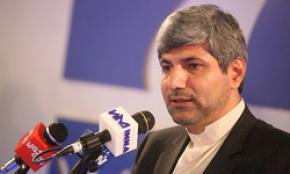ID :
212411
Wed, 10/12/2011 - 13:02
Auther :
Shortlink :
https://www.oananews.org//node/212411
The shortlink copeid
Iran Questions Russia's Decision to Drop Missile Deal with Iran

TEHRAN (FNA)- The Iranian Foreign Ministry has expressed again its surprise over Russia's decision to scrap a deal to deliver S-300 air defense systems to Tehran, but said this was unlikely to affect relations between the two countries.
"Matters of this kind must not have any negative effect on political relations, nor are they having any such effect," Iranian Foreign Ministry Spokesman Ramin Mehman-Parast told a news conference in Moscow on Monday.
"However, we still cannot understand the reason for the non-delivery of what are considered to be defensive systems," he said.
Iran is seeking compensation from Russia in international arbitration for breach of the $800 million contract to supply five battalions of S-300PMU-1 to Tehran, signed in 2007.
The Kremlin banned the sale of S-300s to Iran in September last year, saying the systems were covered by the fourth round of sanctions imposed by the UN Security Council against Iran over its nuclear program.
Russian President Dmitry Medvedev issued a decree in September 2010 prohibiting the sale of S-300 missile systems to Iran, citing restrictions under sanctions the UN Security Council imposed on Tehran in June over its nuclear activities.
Iran dismissed Russia's justification that the ban on the delivery of the S-300 missile system to Iran was in line with the (US-engineered) UN Security Council Resolution 1929, and stated that this is an air defense system which is not included in Resolution 1929.
On June 9, 2010, the UN Security Council (UNSC) imposed a US-engineered sanctions resolution against Iran over allegations that Tehran's nuclear program is military in nature.
After the resolution was passed, Moscow said that it was not obliged to drop the S-300 deal with Iran, since it was not referenced in the UNSC resolution.
But after Washington's continued pressures, Moscow later claimed that upon further study of the sanctions resolution, it was freezing the delivery.
Iran criticized Russia, saying that since Resolution 1929 does not specifically ban the delivery of defensive missiles, Moscow has no excuse for refusing to commit to the deal.
Late last month, Iran lodged a complaint with the International Court of Arbitration against Russia, and Iranian Defense Minister Brigadier General Ahmad Vahidi said, "We have received our prepayment from Russia, but we have sent our complaint to the International Court of Arbitration to receive compensation."
The International Court of Arbitration settles international commercial disputes and since the Russian company (responsible for the S-300 contract) is non-governmental, Iran filed a complaint with the court in order to compensate for its losses.
Russia has paid back Iran's $166.8 million initial payment on the contract.
"Matters of this kind must not have any negative effect on political relations, nor are they having any such effect," Iranian Foreign Ministry Spokesman Ramin Mehman-Parast told a news conference in Moscow on Monday.
"However, we still cannot understand the reason for the non-delivery of what are considered to be defensive systems," he said.
Iran is seeking compensation from Russia in international arbitration for breach of the $800 million contract to supply five battalions of S-300PMU-1 to Tehran, signed in 2007.
The Kremlin banned the sale of S-300s to Iran in September last year, saying the systems were covered by the fourth round of sanctions imposed by the UN Security Council against Iran over its nuclear program.
Russian President Dmitry Medvedev issued a decree in September 2010 prohibiting the sale of S-300 missile systems to Iran, citing restrictions under sanctions the UN Security Council imposed on Tehran in June over its nuclear activities.
Iran dismissed Russia's justification that the ban on the delivery of the S-300 missile system to Iran was in line with the (US-engineered) UN Security Council Resolution 1929, and stated that this is an air defense system which is not included in Resolution 1929.
On June 9, 2010, the UN Security Council (UNSC) imposed a US-engineered sanctions resolution against Iran over allegations that Tehran's nuclear program is military in nature.
After the resolution was passed, Moscow said that it was not obliged to drop the S-300 deal with Iran, since it was not referenced in the UNSC resolution.
But after Washington's continued pressures, Moscow later claimed that upon further study of the sanctions resolution, it was freezing the delivery.
Iran criticized Russia, saying that since Resolution 1929 does not specifically ban the delivery of defensive missiles, Moscow has no excuse for refusing to commit to the deal.
Late last month, Iran lodged a complaint with the International Court of Arbitration against Russia, and Iranian Defense Minister Brigadier General Ahmad Vahidi said, "We have received our prepayment from Russia, but we have sent our complaint to the International Court of Arbitration to receive compensation."
The International Court of Arbitration settles international commercial disputes and since the Russian company (responsible for the S-300 contract) is non-governmental, Iran filed a complaint with the court in order to compensate for its losses.
Russia has paid back Iran's $166.8 million initial payment on the contract.





